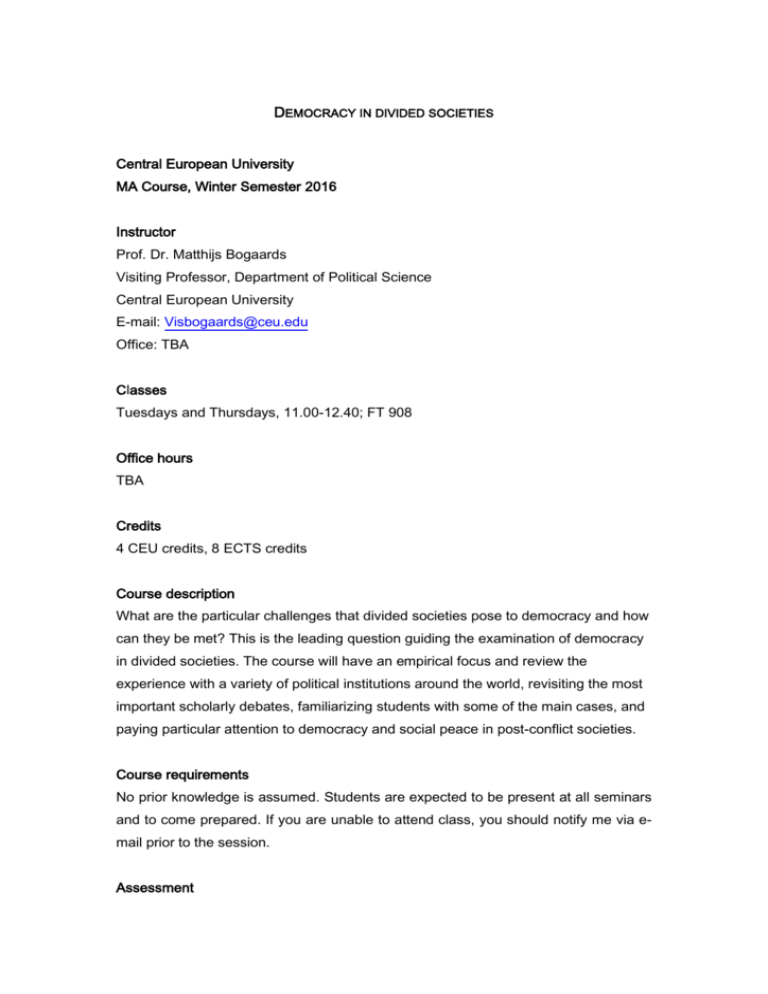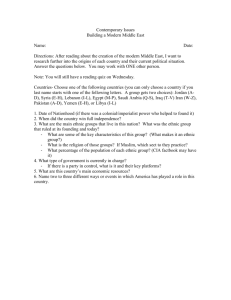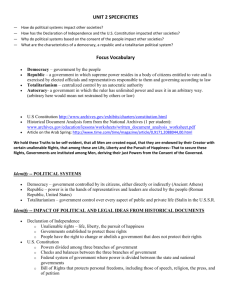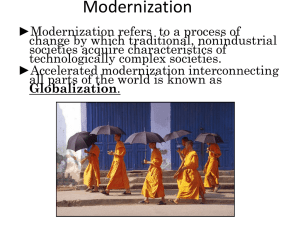Democracy in Divided Societies - Department of Political Science
advertisement

DEMOCRACY IN DIVIDED SOCIETIES Central European University MA Course, Winter Semester 2016 Instructor Prof. Dr. Matthijs Bogaards Visiting Professor, Department of Political Science Central European University E-mail: Visbogaards@ceu.edu Office: TBA Classes Tuesdays and Thursdays, 11.00-12.40; FT 908 Office hours TBA Credits 4 CEU credits, 8 ECTS credits Course description What are the particular challenges that divided societies pose to democracy and how can they be met? This is the leading question guiding the examination of democracy in divided societies. The course will have an empirical focus and review the experience with a variety of political institutions around the world, revisiting the most important scholarly debates, familiarizing students with some of the main cases, and paying particular attention to democracy and social peace in post-conflict societies. Course requirements No prior knowledge is assumed. Students are expected to be present at all seminars and to come prepared. If you are unable to attend class, you should notify me via email prior to the session. Assessment 2 One group presentation (two students presenting together) (25%) Three position papers (3 x 13.33%) Active seminar participation (10%) Book review (25%) Presentations are a team effort of two students working closely together. For more information on the presentation format and the evaluation criteria, see the guidelines and assessment sheet at the end of the syllabus. There are five weeks that are marked “debate” in the syllabus. You are asked to choose three of these debates for a position paper of 800 words each. In this paper, you summarize and critically engage with the arguments and evidence in the reading for that week, concluding with your own evaluation. The position paper is due midnight on the day before the first class that week. If you choose to do an extra, fourth, position paper, the best three results will count. A fail grade, though, will stay. Active class participation is expected and graded. Some guidelines: participate regularly, make informed contributions, focus on the main points, formulate clearly, respond to others in the discussion, and demonstrate critical engagement. The final course assignment is a review of a recent book on a subject related to the course content. The word limit is 1,000. The book review should be written in such a way that it can be published in an academic journal. In fact, the best book reviews will be considered for publication in the journal Zeitschrift für Vergleichende Politikwissenschaft / Comparative Governance and Politics. Please note that for all assessments, late submission and violation of the word or time limit will result in a lower grade. Reading material All the course material is available in electronic form. The syllabus only contains the required reading. At the end of each week, suggestions for further reading will be discussed in class. Learning outcomes At the end of the course the student should be able to: Understand the specific challenges posed by socio-cultural divisions to democracy; 3 Reflect critically on the notions of ethnicity and ethnic conflict; Independently review a major scholarly contribution to the literature on democracy in divided societies; Work together with another student to present on a particular aspect of democracy in divided societies; Make an informed choice of political institutions that help to prevent, mitigate, or channel ethnic conflict; Summarize arguments, assess evidence, and formulate an opinion; Week 1 Introduction The first week provides you with an overview of the main options in the menu of conflict management in divided societies. Reading: McGarry, John, Brendan O’Leary, and Richard Simeon (2008) Integration or Accommodation? The Enduring Debate in Conflict Regulation, in Sujit Choudhry (ed.) Constitutional Design for Divided Societies: Integration or Accommodation. Oxford: Oxford University Press, pp.41-88. Week 2 Book reviews To prepare for the book review you will write for the course, we use this week to look at some examples. Please consult academic journals and select at least one review of a book related to the course content. Be prepared to discuss the book review in class. Week 3 Ethnic Conflict When following the news, one often gets the impression that the world is full of “ethnic conflicts”. But what makes a conflict an ethnic conflict and when does ethnicity result in ethnic conflict? Reading: Chandra, Kanchan (2006) What is Ethnic Identity and Does it Matter? Annual Review of Political Science 9: 397-424. Varshney, Ashutosh (2007) Ethnicity and Ethnic Conflict, in Carles Boix and Susan Stokes (eds.) The Oxford Handbook of Comparative Politics. Oxford: Oxford University Press, pp.274-294. Mweyang Appengnuo, Clement (2010) Misinterpreting Ethnic Conflicts in Africa, Africa 4 Security Brief 4. Washington, DC: Africa Center for Strategic Studies. Week 4 Ethnic Democracy (Debate) No term better captures the tension between ethnicity and democracy than the concept of “ethnic democracy”. This week we re-examine the case of Israel and scrutinize the wider applicability of the notion. Reading: Smooha, Sammy (2005) Ethnic Democracy: in Sammy Smooha and Pritt Järve (eds.) The Fate of Ethnic Democracy in Post-Communist Europe. Budapest: Open Society Institute, pp. 5-59. Danel, Adam (2009) A Methodological Critique of the Concept of Ethnic Democracy, Journal of Israeli History 28(1): 37-54. Smooha, Sammy (2009) The Model of Ethnic Democracy: Response to Danel, Journal of Israeli History 28(1): 55-62. Week 5 Self-Determination versus Pre-Determination Who are the “self” in “self-determination” and “self-rule”? We look at the two ways to regulate access to power-sharing arrangements and examine their empirical record. Lijphart, Arend (1995) Self-Determination versus Pre-Determination of Ethnic Minorities in Power-Sharing Systems, in Will Kymlicka (ed.) The Rights of Minority Cultures (ed.) Oxford: Oxford University Press, pp.275287. McCulloch, Alison (2014) Consociational Settlements in Deeply Divided Societies: The Liberal-Corporate Distinction, Democratization 21(3): 501-518. Week 6 Ethnofederalism (Debate) The debate about federalism in divided societies centers on the question whether subnational boundaries should follow or cut across the country’s main cleavages. We critically examine the arguments and evidence. Reading: Roeder, Philip (2009) Ethnofederalism and the Mismanagement of Competing Nationalisms, Regional and Federal Studies 19(2): 203-219. 5 Anderson, Liam (2014) Ethnofederalism: The Worst Form of Institutional Arrangement…? International Security 39(1): 165-204. Lacina, Bethany (2014) India’s Stabilizing Segment States, Ethnopolitics 13(1): 13-27. Week 7 Partition (Debate) Partition is a controversial solution to civil war, even though the right to autonomy and self-determination is well established. How can this discrepancy be reconciled and what does the empirical evidence tell us? Reading: Bauböck, Rainer (2000) Why Stay Together? A Pluralist Approach to Secession and Federation, in Will Kymlicka and Wayne Norman (eds.) Citizenship in Diverse Societies. Oxford: Oxford University Press, pp.366-394. Kuperman, Alan (2004) Is Partition Really the Only Hope? Reconciling Contradictory Findings About Ethnic Civil Wars, Security Studies 13(4): 314-349. Jenne, Erin (2009) The Paradox of Ethnic Partition: Lessons From De Facto Partition in Bosnia and Kosovo, Regional and Federal Studies 19(2): 273-289. Week 8 Political Inclusion and Exclusion It seems inherently undemocratic to exclude people or groups in a democracy yet the concept of majority rule might end up doing just that. Even if we agree that inclusiveness is good, who should be included? Reading: Cederman, Lars Erik, Andreas Winner, and Brian Min (2010) Why Do Ethnic Groups Rebel?, World Politics 62(1): 87-109. Schwedler, Jillian (2011) Can Islamists Become Moderates? Rethinking the Inclusion-Moderation Hypothesis, World Politics 63(2): 347-376. Week 9 Non-territorial Autonomy (Debate) When scholars and policy makers think about autonomy, they usually think of (ethno) federalism, forgetting that autonomy can also be personal or functional. Reading: McGarry, John and Margaret Moore (2005) Karl Renner, Power Sharing and Non-Territorial Autonomy, in Ephraim Nimni (ed.) National Cultural 6 Autonomy and its Contemporary Critics. London: Routledge, pp.74-94. Nimni, Ephraim (2007) National Cultural Autonomy as an Alternative to Minority Territorial Nationalism, Ethnopolitics 6(3): 345-364. Torode, Nicky (2008) National Cultural Autonomy in the Russian Federation: Implementation and Impact, International Journal on Minority and Group Rights 15(2-3): 179-193. Week 10 Political Parties What role do political parties play in divided societies? Do they aggregate sociocultural divisions or instead politicize them? To what extent can and should democrats regulate party politics? Reading: Kogacioglu, Dicle (2004) Progress, Unity, and Democracy: Dissolving Political Parties in Turkey, Law & Society Review 38(3): 433-460. Basedau, Matthias and Anika Moroff (2011) Parties in Chains: Do Ethnic Party Bans in Africa Promote Peace? Party Politics 17(2): 205-222. Bogaards, Matthijs (2014) Democracy and Social Peace in Divided Societies: Exploring Consociational Parties. Basingstoke: Palgrave Macmillan, pp.81-97 (“From Inter- to Intraparty Consociationalism in South Africa?”). Week 11 Electoral Systems (Debate) In divided societies, the main choice is between electoral systems that promote cross-ethnic moderation and those that allow ethnic parties to win representation. The case of Fiji demonstrates the pros and cons of the various options and the importance of context. Reading: Fraenkel, John and Bernard Grofman (2006a) Does the Alternative Vote Foster Moderation in Ethnically Divided Societies? The Case of Fiji, Comparative Political Studies 39(5): 623-651. Fraenkel, John and Bernard Grofman (2006b) The Failure of the Alternative Vote as a Tool for Ethnic Moderation in Fiji: A Reply to Horowitz, Comparative Political Studies 39(5): 663-666. Horowitz, Donald (2006) Strategy Takes a Holiday: Fraenkel and Grofman on the Alternative Vote, Comparative Political Studies 39(5): 652-662. 7 Week 12 Courts and Consociations There is surprisingly little literature on the role that (supreme, constitutional, or international) courts play in divided societies in general and consociational democracies in particular. Or on the special challenges of constitution making in divided societies. Here we look at the main contributions. Reading: Issacharoff, Samuel (2004) Constitutionalizing Democracy in Fractured Societies, Journal of International Affairs 58(1): 73-93. Lerner, Hanna (2010) Constitution-Writing in Deeply Divided Societies: The Incrementalist Approach, Nations and Nationalism 16(1): 68-88. McCrudden, Christopher and Brendan O’Leary (2013) Courts and Consociations, or How Human Rights Courts May De-Stabilize Power-Sharing Settlements, The European Journal of International Law 24(2): 477-501. 8 Suggestions for presentation The starting point for each presentation is the reading for that week. In preparing your presentation, please choose one of the following four formats: 1. A critique, in which you critically evaluate the premises, argumentation, facts, sources, and/or conclusions of the reading and point out (potential) problems; 2. A supplement, in which you build on the reading to provide additional relevant information, for example by reviewing what other authors have said on this topic, the experience in other countries or other times, etc.; 3. A deepening, in which you select one particular point of the reading and treat this more fully than is done in the paper itself by developing the particular argument started in the paper and exploring its possibilities and limitations; 4. A case study, in which you highlight the facets of the theme dealt with in the paper through the selection and discussion of an illuminating empirical case or a fictitious problem that sharpens our thinking. Presentations should take no more than fifteen minutes. Presentations will be evaluated and graded using the presentation assessment sheet below. We will sign up for presentations in the first two weeks of the semester. You are expected to consult with the instructor in choosing your topic and preparing your presentation. Please note that you cannot do a presentation and position paper in the same week. 9 CEU, Winter 2016, Democracy in Divided Societies (MA course) Prof. Dr. Matthijs Bogaards Group presentation assessment sheet Student names: Session: Date: Academic content 1 Connection to main reading 2 Structure of presentation 3 Original contribution 4 Critical engagement 5 Evidence of broader research 6 Accuracy of information Presentation and team skills 1 Group dynamics 2 Contribution to discussion 3 Time management 4 Referencing 5 Contact with audience 6 Hand out (maximum one page) Consulted instructor: Grade:








